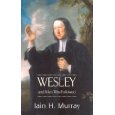 This book received some negative comments when reviewed in the Methodist Newsletter. What annoyed that reviewer most was Murray's criticisms of some of those in recent Methodism who have strayed from the movements evangelical roots. It should be noted that although Murray's negative remarks form a good part of section 4 of this book, section four consists of only twenty-six pages (of over two hundred and sixty pages).
This book received some negative comments when reviewed in the Methodist Newsletter. What annoyed that reviewer most was Murray's criticisms of some of those in recent Methodism who have strayed from the movements evangelical roots. It should be noted that although Murray's negative remarks form a good part of section 4 of this book, section four consists of only twenty-six pages (of over two hundred and sixty pages).Murray is largely a fan of Wesley. He writes as a Calvinist (as Banner of Truth books tend to be) and so he wrestles with Wesley's antagonism towards Calvinism. He believes that some of Wesley's outlook is determined by a misunderstanding of the nature of mainline Calvinism. He recognises Wesley's organisational genius and incredible passion. He has many positive remarks on the nature of the man. However, he also portrays Wesley as a man who neglected his wife (he did not hear of her death until days after her funeral) who could be mean-spirited when engaged in theological disputes.
As well as speaking of Wesley, Murray details something of the life of three other Methodist preachers. Of particular interest is Gideon Ouseley who worked in Ireland. Reading about these men fires you up for mission and challenges you to be more engaged in prayer. I found these lives to be truly inspiring.
A third section deals with two areas of doctrine. Murray thinks that Wesley was somewhat ambiguous about whether Christ's righteousness is imputed to the believer (or whether justification is simply pardon for sin). He also deals Wesley's doctrine of perfection (an experience Wesley did not claim for himself). While any Methodist minister I ask about perfection say that they agree with it they tend to define it in a way that differs from Wesley. While Wesley was right to associate holiness with love for God I believe he was wrong to think in terms of an instant experience sanctification that frees a person from 'inbred sin' (although not from making mistakes).
I must say that I really enjoyed reading this book. It challenged my lack of passion. I heartily recommend it to all (even if all will not enjoy every part of it).
I added the following illustration, taken from this book, to Sunday's sermon on Acts 4:1-22:
One early Methodist preacher, John Nelson, was brought before an official and asked to state the offence for which he was imprisoned, he replied: ‘For warning people to flee the wrath to come, and if this be a crime I shall commit it again, unless you cut my tongue out; for it is better to die than disobey God.'
No comments:
Post a Comment